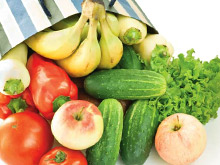Health Topics
-
Healthy Living
-
|
|
February 2010
|
| Anti Cancer Diet |
| Sunita Pant Bansal |
| |
 |
While there is no special 'anticancer diet,' eating plenty of certain fruits and vegetables can certainly help reduce your risk of getting cancer. Apart from a healthy diet, weigh-loss and exercise also play an important role in preventing most cancers. |
Studies show that being overweight or obese is strongly linked to an increased risk of several common cancers – like cancers of the colon, breast, kidneys, esophagus, endometrium, and pancreas to name a few. Excess body fat, especially around the waist, is linked with insulin resistance and high insulin levels. Although insulin is commonly associated with blood sugar and diabetes, researchers think that high levels of insulin may promote the growth of cancer cells too. Excess body fat also poses a specific risk to older women. After menopause, excess weight is associated with higher levels of estrogen. That can promote the development and growth of estrogensensitive cancers of the breast and endometrium.
Hence, physical activity has a vital role in lowering cancer risk. It can directly reduce insulin resistance and the levels of reproductive hormones. Indirectly, it can help achieve and maintain weight loss, as well as prevent the weight gain that many adults experience, as they get older.
Plant foods offer protection in a number of ways. Fresh fruits and vegetables provide a number of phytochemicals that are natural antioxidants. Many of which seem to protect and repair our DNA. Some antioxidants appear to affect cancer cells, controlling their growth and spread.
Some foods can have a more direct effect on specific types of cancer. For instance, the foods containing fibre seem to lower the risk of colon cancer. Fibre moves potential carcinogens through the intestines faster, decreasing the contact time between carcinogens and the intestinal wall. Besides pushing them through faster, fibre binds carcinogens, keeping them away from the intestinal wall. Fibre also absorbs bile acids, keeping them from being acted upon by bacteria to produce fecapentanes (cancerous substances that are formed by decaying foods within the colon). Fibre also promotes the growth of healthy bacteria in the intestines, crowding out the undesirable bacteria.
There are two ways in which dietary fat contributes to cancer. First, tumor cells need low-density lipoproteins (LDLs) to grow. Therefore, a diet that helps to lower LDL levels could keep potentially cancerous cells from growing. Eating fat also stimulates the production of bile, which is needed to digest fat. If a lot of bile is allowed to stagnate in the large intestine for a long period of time, it's converted into apcholic acid, a proven carcinogen. Eating meat, especially red meat, is associated with increased risk of colon cancer, due to its high fat content. Some processed meats contain nitrosamines, which can be carcinogenic to the colon.
Omega 3 fatty acids, such as those found in oily fish, flax seeds, walnuts and olive oil, help produce cancer-fighting phytochemicals. Flaxseed oil also contains the anticancer phytonutrients, lignans. So, replacing the red meats with seafood and replacing hydrogenated fats with healthy oils like olive oil, is recommended.
Soy is a healthier source of protein than meat. The primary anti-cancer value of soy seems to come from phytonutrients (for example, isoflavones), which inhibit the growth of new blood vessels necessary for tumour survival. Soy also protects against colon cancer by blocking the carcinogenic effects of bile acids (by a process called angiogenesis).
Calcium in the food controls the multiplication of epithelial cells lining the colon. When these cells proliferate at a fast rate, the risk of cancer increases. Calcium also binds cancer-producing bile acids and keeps them from irritating the colon wall. The best source of calcium is milk and its products.
Selenium is a potent antioxidant, a scavenger of carcinogenic free radicals. Best sources of selenium in food are fish, lobster, shrimp, whole grains, and vegetables, brown rice, cottage cheese, chicken, sunflower seeds, and garlic.
The intestine-friendly bacteria, Acidophilus, have been shown to have anti-cancer properties. They promote the growth of healthy bacteria in the colon and reduce the conversion of bile acids into carcinogens. They are found in yoghurt. Green tea has been shown to inhibit the growth of cancer cells; possibly because of phytochemicals it contains called catechins.
THE 10-STEP ANTI-CANCER REGIME
- Stay lean.
- Increase exercise.
- Eat lots of fresh fruits and vegetables.
- Increase fibre to between 25 and 35 grams a day.
- Limit dietary fat to 20 percent of total calories, with less than 10 percent of total calories as saturated fats. Eliminate hydrogenated fats.
- Switch from red meat to seafood and soy products.
- Eat foods high in the antioxidants beta-carotene, vitamin C and vitamin E.
- Eat foods high in calcium and selenium.
- Consider daily supplements of Flaxseed meal (ground flaxseed) and Acidophilus powder.
- Switch to green tea.
|
|
 |
Sunita Pant Bansal, Senior Wellness Consultant for Apollo Life |
|
|